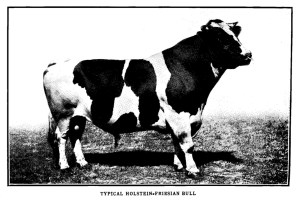17-year-old Helena Muffly wrote exactly 100 years ago today:
Friday, June 14, 1912: Such a time as I had a running after Jake this afternoon. He broke out of the field and when I spied him he was walking up the railroad. Carrie was over this evening.

Her middle-aged granddaughter’s comments 100 years later:
Hmm—who was Jake? I never really thought about it before, but I bet that the Muffly’s had a bull—and that Jake was the bull’s name.

Bulls are MEAN. They have unpredictable tempers and sometimes charge people.
This adds a whole new dimension to what watching cows involved. When Grandma wrote about watching cows—it probably wasn’t a pastoral pastime, but a potentially dangerous job.
An aside—Most farmers started using artificial insemination to breed their cows in the 1950s and 60s—and they were very, very glad that they no longer needed to have bulls on the farm.
I like these farm stories about cows, bulls, gardening, and so forth. Goodness, I’ve heard and read similar stories about my husband’s grandmother. Only the bull actually attacked her. Thanks, Sheryl.
Hopefully she wasn’t hurt.
Great diary entry and blog post. Sometimes your grandmother’s diary presents such interesting mystery … Thanks for helping us fill in the blanks!
I always hope that the blanks that I fill in are the right ones. On days like today, I need to make some guesses about the meaning of the words in the diary.
In all honesty, I first thought Jake was a dog, but I had absolutely zero basis for that. Your theory makes sense!
That was my first thought, too–but somehow it didn’t quite seem right that she would say that a dog broke of the field. But we’ll never know for sure what she meant. 🙂
It’s great that you can bring up from her sparse writings, what was going on around her. I can imagine with all they had to do there was little time to write long passages… and it’s a wonder she kept after it. You must have a natural empathy for her to bring so much to life. That’s a rare and wonderful gift.
I’d never thought about it that way, but you’re probably right that I must have a natural empathy for my grandmother. I really enjoy the process of looking at the entries one day at a time. Before I started this blogging project, I read through the entire diary, but now I don’t look more than a couple days ahead. I’m constantly amazed how much more I get out of the entries when I go through them at this slower pace.
Very interesting and I like how you included the updated picture of where the entry happened. Patty
My mother parents had a small dairy farm. In fact they moved there in Feburary 1910. It was in Westmorland Co. My mother was born 7 years later but she loved watching the cows. She hated housework and spent her time with the cows. She liked it because she could sit in the shade and read library books or do needle work part of the time. Not all the farms with cows had bulls, they would lease the bulls out as a stud service. My family had a bull name Fritz and he got to spend time visiting many lady cows in neighboring farms.
The rural areas of Penna. didn’t start getting electric power until the late 20’s so you had to hurry up after dark in the summer time because you were burning lamp oil and candles that was saved for short winter days. They didn’t like to waste anything on a farm.
I really enjoyed reading your description of what it was like for your mother to watch cows when she was a girl in Pennsylvania It really helps me better picture what it might have been like for my grandmother.
And, the story about Fritz is wonderful. It makes a lot of sense that not every farmer would own a bull–and that bulls would be leased.
Ahh, Jake, the bull — but wasn’t Jake also the name of one of her teachers?? Or perhaps I mis remembered/
You’re right. You have a good memory. Her teacher during 1911 and the early part of 1912 was Jake. For example, on December 12, 1911 she wrote: “Jake says we have to study harder. It seems to me such tiresome work, but I suppose I could if I tried hard enough.. .”
I never could figure out why she called her teacher Jake because several McEwensville local histories say that the teacher’s name was Howard Northop.
This may be too much of a stretch–so I didn’t put it in the post –but I wonder if it’s an example of Grandma’s sense of humor. Based upon what she wrote I think that her teacher was relatively young. I wonder if behind his back in the diary she referred to her teacher using the same name as the family bull. Farmers and their families sometimes have an interesting sense of humor . . .
Thanks for another great post, Shery. Not having any experience on a farm I never would have imagined the trouble or the dangers!
I’m glad you enjoyed it. There are many, many things that are wonderful about farm life–but it can also sometimes be dangerous.